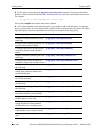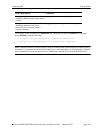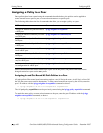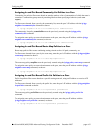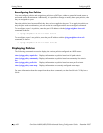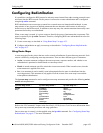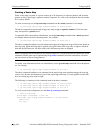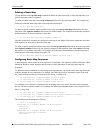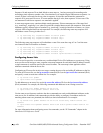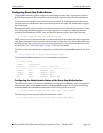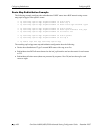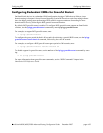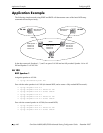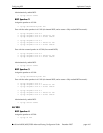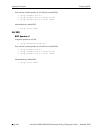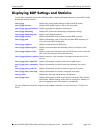
Configuring Redistribution Configuring BGP
page 4-56 OmniSwitch 6800/6850/9000 Advanced Routing Configuration Guide December 2007
Sequence 10 and sequence 20 are both linked to route map rm_1 and are processed in ascending order
according to their sequence number value. Note that there is an implied logical OR between sequences. As
a result, if there is no match for the tag value in sequence 10, then the match interface statement in
sequence 20 is processed. However, if a route matches the tag 8 value, then sequence 20 is not used. The
set statement for whichever sequence was matched is applied.
A route map sequence may contain multiple match statements. If these statements are of the same kind
(e.g., match tag 5, match tag 8, etc.) then a logical OR is implied between each like statement. If the match
statements specify different types of matches (e.g., match tag 5, match ip4 interface to-finance, etc.), then
a logical AND is implied between each statement. For example, the following route map sequence will
redistribute a route if its tag is either 8 or 5:
-> ip route-map rm_1 sequence-number 10 action permit
-> ip route-map rm_1 sequence-number 10 match tag 5
-> ip route-map rm_1 sequence-number 10 match tag 8
The following route map sequence will redistribute a route if the route has a tag of 8 or 5 and the route
was learned on the IPv4 interface to-finance:
-> ip route-map rm_1 sequence-number 10 action permit
-> ip route-map rm_1 sequence-number 10 match tag 5
-> ip route-map rm_1 sequence-number 10 match tag 8
-> ip route-map rm_1 sequence-number 10 match ipv4-interface to-finance
Configuring Access Lists
An IP access list provides a convenient way to add multiple IPv4 or IPv6 addresses to a route map. Using
an access list avoids having to enter a separate route map statement for each individual IP address. Instead,
a single statement is used that specifies the access list name. The route map is then applied to all the
addresses contained within the access list.
Configuring an IP access list involves two steps: creating the access list and adding IP addresses to the list.
To create an IP access list, use the ip access-list command (IPv4) or the ipv6 access-list command (IPv6)
and specify a name to associate with the list. For example:
-> ip access-list ipaddr
-> ipv6 access-list ip6addr
To add addresses to an access list, use the ip access-list address (IPv4) or the ipv6 access-list address
(IPv6) command. For example, the following commands add addresses to an existing access list:
-> ip access-list ipaddr address 16.24.2.1/16
-> ipv6 access-list ip6addr address 2001::1/64
Use the same access list name each time the above commands are used to add additional addresses to the
same access list. In addition, both commands provide the ability to configure if an address and/or its
matching subnet routes are permitted (the default) or denied redistribution. For example:
-> ip access-list ipaddr address 16.24.2.1/16 action deny redist-control all-
subnets
-> ipv6 access-list ip6addr address 2001::1/64 action permit redist-control no-
subnets
For more information about configuring access list commands, see the “IP Commands” chapter in the
OmniSwitch CLI Reference Guide.



